#but I think that was kind of my fault
Text
Network Effect was the best murderbot book so far. And I was already obsessed before this one
About to read Fugitive Telemetry and after I finish that I might just go ahead and start the series over
#my thoughts#it’ll be so interesting to see murderbot at the beginning of its journey again#I’ll be able to see how much it’s grown#and better understand some stuff#very excited to read artificial condition again#I think rogue protocol has been my least favorite#but I think that was kind of my fault#I was briefly in a bad headspace and I should have stopped reading it but I was hoping it would pull me out#but instead I didn’t really enjoy it as much#murderbot#tmbd#the murderbot diaries#Martha wells
11 notes
·
View notes
Note
hiii im sure you’ve answered this before but in regards to your twst x Pokémon, how do you choose which Pokémon go give to the cast?? really curious since your choices are unique :O
unique in a good way, I hope? 😅 (jk jk I haven't come across too many pokemon AUs, so I was going in without preconceptions, I guess!) I was sorta aiming somewhere between doing, like, a full AU with internal consistency and everything, and just picking entirely based on theme/character, so maybe that's why! basically I just set some arbitrary rules (no legendaries/no repeats/evo stages based on year) and then went on ~vibes~. a couple were also suggestions (thank you guys!) and last-minute decisions, so it was a bit of a delightful mess of ideas!
my one regret is that I should have given Riddle a Togedemaru after all. ...you know what, he can have one now, why not

#art#twisted wonderland#pokemon#poketwst#okay i have one other correction to make#which is that i think vil should also have a garbodor#NO LISTEN#i have thought about it a lot but i just do not want to give him a milotic#and this is because -- now hear me out#neige would actually be the one with a milotic#(it fits his personality more and it's even in his colors!)#when they were kids vil had a trubbish and neige had a feebas and vil felt superior until the whole milotic thing happened#and he's secretly kind of bitter about it#but he also secretly loves his garbodor a lot and gets mad when people make fun of it#IS HE NOT BEAUTIFUL ENOUGH FOR BOTH OF THEM#also garbodor ferments poison inside of it! it would be the perfect alchemy assistant!#I'M RIGHT OKAY#(i am also a big fan of trubbish/garbodor and i don't personally think they're ugly anyway)#anyway enjoy this drawing because it completely exploded my computer#(it was not the drawing's fault it was just unfortunate timing)#i've mostly got things working again but oof. it's been. a day. 🙃
1K notes
·
View notes
Text
Prompt 144
Danny regrets nothing. He regrets absolutely nothing at all. Okay so maybe he regrets things a little bit, but it’s hard to concentrate. It’s hard to think, he…
He’s never died a second time before.
It’s… weird. His head hurts, his body too-small, not in a younger sense, but almost in a… feeling sense. His skin feels colder, and his hair has- it has bits of white in it now? And he’d already been able to use his ghost abilities even in his human form but it feels… easier now.
He’s not overshadowing his own corpse- he doesn’t think he is? His head hurts… his everything ached actually, like he’d gotten electrocuted again even if he’s certain that wasn’t how he died.
Did- did someone throw his body into the sewers?
Seriously, what the heck? Who would do that?! Urgh, that made him so mad- who just throws a corpse around, nevermind his corpse! That’s so rude!
…
Hello crocodile-man staring at him in slight horror, please ignore the blood covering the back of his head, the wound has healed, he will be out of your way once he can talk again- Wait, there’s no need to call for someone-
#dcxdp#dpxdc#prompts#waylon jones#solomon grundy#danny fenton#Waylon staring at what he’s pretty sure is a baby Grundy situation:#Waylon: Heeey sewer buddy you wanna c’mere for a hot minute-#Waylon: Oh my gotham what do I do there’s an undead child or teenager staring at me#Waylon: Why are they so skinny and why are they down here- oh no#Waylon: Oh no what if the Bats think it’s my fault somehow- c’mere small probably fragile child we’re going to Grundy#Danny: I would struggle but honestly rigor mortis is a bitch that suddenly sets in & takes a bit to leave#Honestly blame my discord buddy#specifically the one who joked about WaylonxGrundy#because honestly the idea of them being together is actually kind of sweet and cute ngl#Like Waylon is canonically one of the only ones that stick by Grundy's side even when he comes back 'wrong' or 'dumber'
418 notes
·
View notes
Text
Just to clarify my thoughts (since I've had a number of people ask me about it) re: Job and cursing God. There's a big difference between cursing God as used in Scripture and how we generally would think of cursing at God today.
Cursing someone, in the Bible, has a lot of depth to it. It's not just saying "screw you " in anger, it's got a sense of forsakenness to it. It's the opposite of a blessing, a removal of blessing. If the blessing is presence, your face shining on the person you're blessing, then a curse is absence. In some translations, Job's wife tells him to "renounce God and die," which I honestly think makes a lot more sense to modern ears.
Job says a lot of unpleasant things to and about God in his anger and grief. So do the Psalmists. A number of the Prophets. So can we. God can take it if we come to him with honest expressions of our emotion, including those not-so-nice ones directed at him. I don't think there's anything wrong with getting mad at God and saying, "How dare you, you bastard" when you suffer unjustly. You can say much worse, I think, without sinning, though I don't feel particularly inclined to give examples. But as long as it's an honest expression of your heart, I think you're doing exactly what prayer is for. You're presenting him your heart with an open hand. He can use that. Opposite of love is not hate but indifference, etc.
Job doesn't renounce God. Neither should we. But I think when you're truly suffering, you're gonna have those feelings toward God either way. He'd rather you address them with him directly than try to avoid them. Cursing at God in the modern sense is actually a great way to keep the relationship strong and not end up cursing/renouncing him in the Biblical sense.
#i did try to draw that distinction in the original post but I didn't really go into detail#mostly bc i was trying to be concise and just focus on how the church talks to sufferers#so here's the long version#pontifications and creations#only thou art holy#also side note: there was someone yesterday who responded to that post with the suggestion that suffering is generally the sufferer's fault#and it got worse from there#just an absolutely rank response that had me immediately blocking that person and googling if there was a way to remove someone's addition#idk to what degree that person is an active member of this broader christian community we've got going on here#but if you see that post (and you'll know it when you see it) please as a favor to me don't interact with it#there were some lovely responses and additions to that post yesterday too#but that one made me mad#idk. to a certain degree i wanted to vent#they're blocked now though so whatever#anyway. I've sort of been percolating on these various thoughts for a few weeks#since i went to a really fluffy women's talk on suffering#and now i kind of want to give my version#I'm far from the greatest sufferer in the world. i am well aware of that#but as I've been sick I've just done So Much Thinking and reading about theodicy and struggle with God that i feel qualified to opine#unlike the giver of that talk#anyway#tag rant over#...for now#theodicy
174 notes
·
View notes
Photo
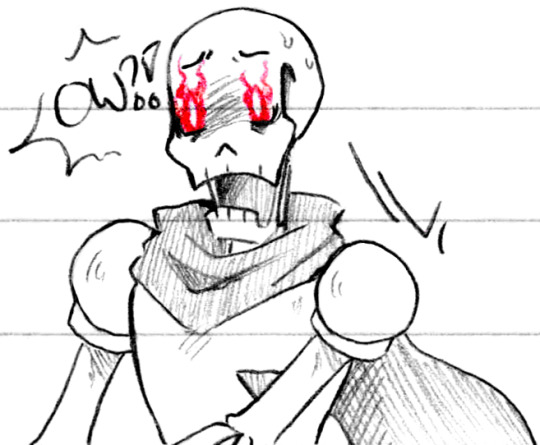

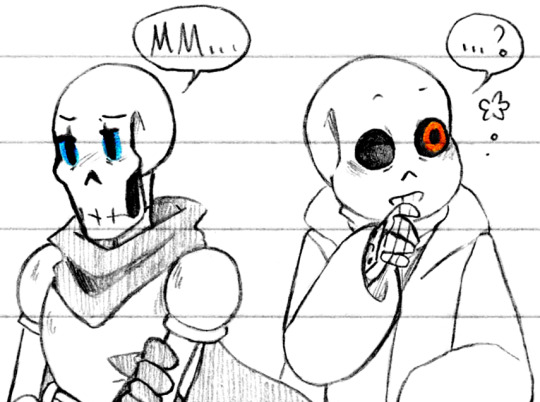





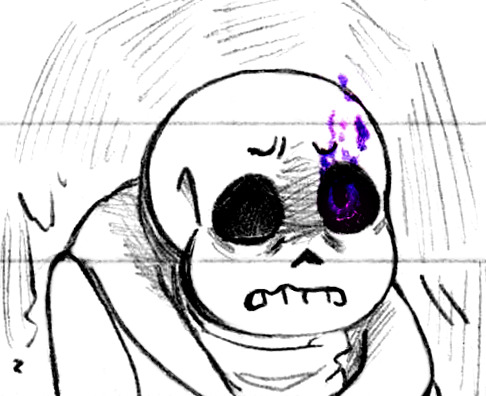
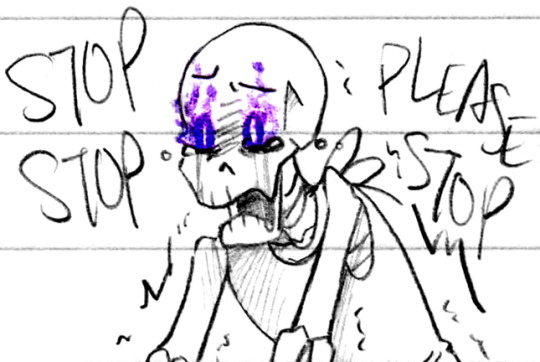
Rainbows (Patreon)
#Doodles#UT#Handplates#Papyrus#Sans#This rainbow is all out of order - and so many negative glows ah :0#I didn't mean for them to trend negative! They were just easier to imagine the expressions - maybe I'll take a second pass on the positives#Or in green's case the negative :')#Again in order of when I drew them so kinda all over the place haha#I wanted to go in order! And then I got distracted pft - thus started with red ow :(#Honestly I was thinking of it just being a surprise-pain more than anything lol - like a splinter haha that wouldn't even pierce him!#D'you think that eyeglows could also act like automatic word-responses? Like how we say ''Ow'' when we're surprised but not hurt sometimes#Silly haha#The second is a lot less silly-intended tho more actual pain#It's also sad to think that Sans' red would pretty much have to be sympathy/emotional pain :(#The kind of survivors guilt of not being able to shoulder more but he's so fragile! It's not his fault!#I am quite happy with both of their expressions there tho especially their mouth shapes - and how the colours interact with their eyes#Lineless colours are some of my favourites :) You can tell it's my pencils and not my pen there 'cause it's feathery hehe#For example Edgar's scars are usually with my pen and they have an almost hard-line quality while my pencils are soft :) S'pretty#Switched colours! I unfortunately misremembered what their meanings were oops lol#Well I got them kinda half-right - I like blue as skeptical quite a lot :D I think it suits them both!#Sans as wary and logical and wanting to keep distance to assure his safety and what he can devote energy to - I like it!#And Papyrus using his brother's colour to be grown up in the way that Sans is hehe <3 It's sweet#I misremembered orange lol I assigned blue's alt meaning of ''curiousity'' - orange is meant to be bravery! Oops lol#I think I was thinking of Papyrus' childlike excitement and wanting to know and be involved! Haha#Greeeeens <3 Happy boys happy with each other! I love when they're happy ♥ Interlocked holding hands hehe#Pinks! Along a similar line! I like pink as platonic affection :D And as embarrassment lol but hgg the sweetness! The care and love!#Is my bias showing lol - especially with the bros sleeping on each other haha ♪ They're both happy to know the other is safe!#Couple'a stresses - I like Sans' more I'm not even gonna sugarcoat lol his expression turned out so good haha#And the inverse for the purples! I do like Sans' face but his body :P Papyrus tho - he turned out sad and perfect :')
309 notes
·
View notes
Text
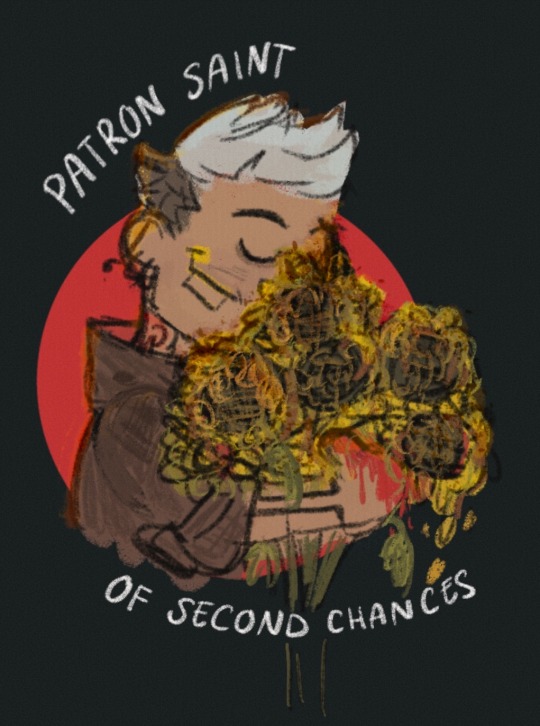
can we talk about how V gives other people second chances to live when he was only granted a second chance to die, and how little v is kind of a dying sunflower because he, too, is something cheerful that’s wasting away..?
#*charlie kelly pepe silvia voice* pls ive been dying to talk about sunflowers and tragedy and little v all day#ya ever think how St. Vincent literally is the patron saint of charities#cyberpunk 2077#lil guy v#i drew this tag#anw yea silly doodles coming just had to get this outta my system woowee#little v is kind to a fault but he gets to have what he wants because of it:#being remembered by haunting everyone's lives
160 notes
·
View notes
Text
True knowledge exists in knowing you know nothing || Dr. Ratio & Socrates
Okay, I legitimately laughed out loud writing that title, but listen. LISTEN.
Ratio's inspirations derive from many sources; from referencing Archimedes's brain-blast in the tub, to being doomed to have his head bonked by Newton's apple ad infinitum in his idle animation, to his ultimate line ('esse est percipi' / 'to be is to be perceived') a direct quote from Berkeley on Idealism - it's apparent that his design nods towards scholars across time periods rather than being a direct parallel to a singular academic.
Nevertheless, just for fun, I've been rotating Ratio and ancient greek philosophers around in my head and have had a great time chewing over how parallels Socrates in particular. I am in no way saying that Hoyo even thought about Socrates while they were designing Ratio, but I thought I'd share my thoughts. I think there are some worthwhile parallels to be drawn that touch on all aspects of Ratio's own philosophy regarding ignorance, the value of knowledge, and his deep appreciation of life. So, let's get into it.
Ratio is interested in humanity and curing 'ill minds with knowledge', that 'to turn a blind eye to the folly of others is not an etiquette, but a wicked worldly practice.' Ignorance is a disease - this is a concept that can be viewed through a Socratic lens. Socrates believed that that virtue and knowledge were impossible to separate from one another, and that virtue could be developed through acquiring knowledge and insight. If knowledge is virtue, then ignorance is vice. In Socrates's mind, no one would rationally choose to do something bad. People might choose to do bad things, but this is rooted in their own perception of the world - as in, someone would only choose to do something bad (for the world, or for themselves) because they believed (erroneously) that it was the right or good thing to do. To Socrates, the cure to this was knowledge: 'There are two kinds of disease of the soul, vice and ignorance.' & 'What does most harm in the world is not sinfulness but ignorance'.
To Ratio, 'If ignorance is an ailment, it is the duty of the scholars to weed it out and heal the universe'. He views his own ignorance as 'filth' that must be cleansed through methods such as reading. He also views knowledge as a method for humans to overcome their problems - 'Another day has passed. If your problem still hasn't been solved, is it possible the problem is you?' & 'You look distressed. Is something troubling you? if so, you can figure it out for yourself.' These statements sound harsh, but they also clue us into Ratio's philosophy - that through self-examination and improvement, one can overcome one's ailments.
Socrates was also known for being a trouble-maker, he was abrupt and tactless and did not care for someone's social standing nor decorum. He was also known for using what is now called the Socratic method, asking a series of questions that ultimately seek to show contradictions in the beliefs of those who posed them, and to move systematically towards a hypothesis free from contradiction. Socrates rarely made assertions himself - after all, he had no wisdom of his own. But he could interrogate others in order to expose their own foibles, much to the embarrassment and annoyance of those around him. He was once described as a 'gnat' chewing on the 'lazy horse of Athens', causing it to wake up and spring to life due to his persistent gnawing and prodding. Ratio also employs the Socratic method - 'I'm asking questions' - and also adopts sophist tactics such as playing devil's advocate and taking opposing sides (with both himself as seen a story quest, and with others as we see with his texts urging us to take up a side so he might debate us). Through questioning and interrogation, upsetting what we consider social convention and norms, we can dispel contradictions and thereby come closer to some form of truth.
To add to this - as highlighted in the replies below - Ratio’s skill ‘intellectual midwifery’ is a reference to the Socratic method. The idea being that Socrates helped those around him give birth to the knowledge that was already within them, rather than treating his students minds as empty vessels for him to fill with his own answers. Again this is beautifully echoed in Ratio - he doesn’t want to tell you how to live your life, he wants you to work out for yourself what it is you need, thus empowering oneself through self-examination and questioning.
Socrates did not believe in writing anything down. He believed that face-to-face communication was a far more effective way of communicating knowledge - which means, unfortunately, what we know of Socrates is primarily derived from secondary sources. Much of what we know about him today comes from Plato's dialogues, and Plato was known for liberally exercising artistic license.
Although Ratio is not dead, I find it interesting that his character story is told exclusively through secondary sources. To quote - '…There are no less than eight documentaries detailing his legendary exploits, and over a dozen memoirs about him. However, despite the plethora of commentaries, none of them seems to provide a compelling perspective.' It's as though there are no surviving fragments penned by Ratio's hand and all we have to go on is through the lenses of other people. This challenges us, perhaps, to try to think about our own interpretation of Ratio since secondary sources cannot be taken as a wholly unbiased account - and once again employing the Socratic method and empowering the reader to come to their own interpretation.
While Socrates left no writing behind, he was interested in spreading knowledge. Socrates spent most of his life in Athens, a city that was, during his lifetime (~470-399 BC), a hotpot of scholars, wisemen and philosophers. Athena, the Greek god of wisdom, was named after the city - her symbol the owl that is also appropriately perched on Ratio’s shoulder. Also in Athens at this time where the sophists. The sophists were a class of intellectuals who were known to teach courses in various subjects - but often for a high fee, and generally centred around the idea that persuasion and the use of knowledge as a tool was more important than wisdom or truth itself. There's some debate about whether Socrates could be characterised as a sophist himself, but, crucially, he is characterised as refusing to take payment for his teachings. He was born a plebeian (perhaps you might describe it as a mundane background.) He was known to dress in rags and go barefoot, speaking to and (often antagonising) people from all walks of life, preferring the marketplace as a center of debate than palaces or courtrooms. I can't help but think of the sophists as similar to the genius society (or at least Ratio's depiction of them in contrast to himself), cooped up in ivory towers and gatekeeping knowledge to the most privileged. He doubts if Herta's talent is always helpful to others, he compares Screwllum to a 'monarch'. Then again, the sophists may in fact be a bit of a parallel to the Intelligentsia Guild - from Ratio, 'when someone is willing to listen to knowledge that is being disseminated and circulated, a price is created'.
Socrates (or at least the Platonic depiction of Socrates) was at one time declared the wisest man in Athens by the Oracle of Delphi. Socrates balks at this assertion - how can he possibly be the wisest man in Athens when he in fact knows nothing at all? This was not a claim made of modesty - he truly believed that he had no wisdom, that he was unsure what 'wisdom' itself even was. Ultimately, Socrates concludes that the only way that the Oracle could be correct is that by actually acknowledging that he knows nothing he paradoxically is the wisest man in Athens. All wisdom, therefore, is rooted in wondering, with wondering only possible if one is open to admitting one's own ignorance.
What I love about all of this in relation to Ratio is that Ratio styles himself as a mundanite. The Intelligensia Guild advocates that 'all knowledge must be circulated like currency' and accepts 'all beings… who seek to learn'. Ratio has no time for the satisfied self-styling of intellectualism, he himself states that 'to speak knowledge, we must first make people realise their own folly.' No one is above criticism in this regard, even himself - again, to quote 'Whenever someone agrees with me, I feel like I must be wrong.' Again, I feel as though he would resonate with Socrates here: 'Smart people learn from everything and everyone, average people from their experiences, and stupid people already have all the answers'. With Aventurine, he is quick to mock his appearance as over-the-top and vapid - once again making it clear his distate for vanity and hollow displays of showiness (albeit he may have been acting for Sunday's sake here. Also, no comment about this coming from a man who runs around in a toga, lmao)
Equally, with Aventurine, it is clear that Ratio is willing to learn from him - he apologises when he offends, he abhors his methodology and yet he still relies upon it and trusts in Aventurine's plan, he is drawn to him in some ways precisely because he is so different to himself. Aventurine (at least styles himself) as impulsive to Ratio's slow and steady methodology, Aventurine whose learning has been entirely self-made vs Ratio who has spent his life in classrooms, Ratio who scoffs at Aventurine's favourite games of chance yet adds slot machines to his simulated universe.
And to Socrates, the experience of aporia – in all of its discomfort and disruption – is the very catalyst of wonder, and that wonder was not just the root of wisdom but also the way to live a good and happy life. There is something beautiful in this to me, and this extends to Ratio. Ratio fundamentally cares about life. For all his brashness, his lashing out against 'idiots', his harsh demeanour - he wants people to live good lives, he wants to contribute to the good of humanity - all people, even those he is annoyed by, he cares so profoundly and absolutely about life. The entire reason why he is obsessed with wisdom and learning is not to exalt or elevate himself, not as some kind of ritualistic expression of piety towards a deity, but it is instead an expression of devotion towards life itself. Ratio has a strict work out routine not so that he can show off his body, but because living healthily is living well and working out is a component of that. Even the way he fusses and worries about Aventurine, someone he is pointedly irritated by, reveals how deeply his care runs. So so much of his character is centered on caring for life, even if it is not immediately obvious.
Finally, I'd like to highlight some ways in which Ratio is not like Socrates. First of all, Socrates was repeatedly described as 'ugly' by fellow philosophers Plato and Xenophon - this is contrast to Ratio being repeatedly described as 'handsome'. This is an interesting subversion to me (albeit likely an indulgent one) as in both cases both men attempt to distance their physical appearance from the weight of their words. Ratio wears the bust for many reasons, but way to view it is that he is attempting to stop his appearance from bearing any influence in the subject of debate.
Socrates was also said to be blessed by a divine touch, and as we know, this is something that agonises Ratio as Nous has not yet turned THEIR gaze towards him.
Lastly, Ratio has - thankfully - not yet been ordered by the state to drink hemlock for all his trouble-making and blustering. Though perhaps he may someday be put on trial by the IPC if the theories that he is working alongside Aventurine to undermine the corporation are true - we will just have to wait and see.
Thanks for reading my little ramble. I'd be super interested in anyone's thoughts if they'd like to share, but regardless, I'll leave off on some of my favourite wee quotes from the Rat man:
'Even a life marked by failure is a life worth living - it is only in moments of solitude and despair, when help is absent, that fools grasp how to pick themselves up.'
'Do stay alive. I wish you the best of luck.'
#dr ratio#ratio#aventurine#hsr#honkai star rail#my witterings#i love the rat man so much idk#much of the information i describe about Socrates comes from the podcast History of Philosophy without the Gaps#which I highly recommend if this is your kind of thing lol#but mostly I just wanted to have fun spinning my hyperfixation around lol#Also I make a few declarative statements throughout this but know that I do not claim to be a scholar of greek philosophy lol#please check the verasity for yourselves before relying on what I have to say#for I know nothing u see u see? :P#also I just wanna add in that I do NOT think Ratio is a perfect human being#ratio can be hypocritical and cruel and ignorant just like the rest of us#but I adore that too as afterall he is also an expression of humanity#with all its earthy faults
99 notes
·
View notes
Text
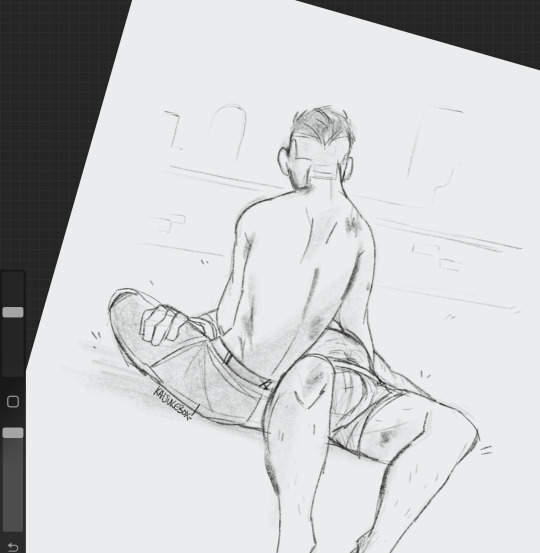

Happy Christmas Eve, here’s yet another couple of messy HarryKims 🫶
-
Ref 1
Ref 2
#disco elysium#harry du bois#kim kitsuragi#ooooohhhh im not gonna make the deadline but yet im so close to 100!!#had a mental breakdown on Twitter but everyone was really kind and I think I’ve come to terms with it just not getting done by the 31st#errybody helped me see that work was a bitch to me and it wasn’t my fault…so I can cut myself a break#but I’m still gonna do it!#plus I’d like to get to all the inbox hugs :)#100hugs2023#hug 85/100#hug 86/100
178 notes
·
View notes
Text
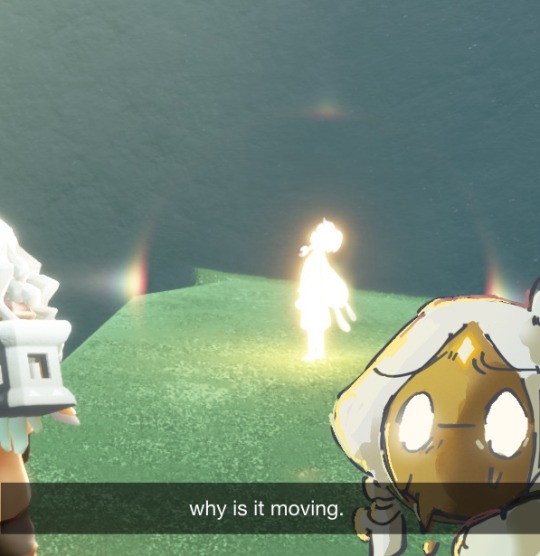
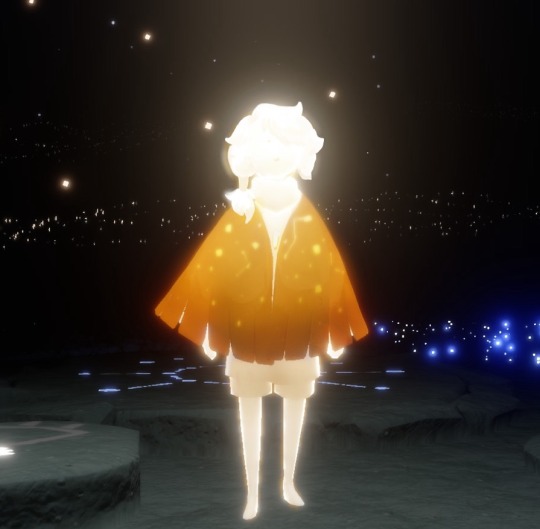
edited/drawn over pictures i took of a winged light and a strange guy i met in orbit since they looked similar to kego (oc)
#sky cotl#sky children of the light#skyblr#sky cotl oc#sky cotl spoilers#my art#sure. kinda#i don't think the orbit figure is supposed to be there lol. pretty sure it's gonna be patched out next update#but honestly its damn close to what kego would look like in-game tbh. outside of the winged lights but they are capless#he's not like. Alef 2 but generally a bundle of light and plasma that's vaguely skykid shaped (and can be other things)#almost a skykid. a star with no shell.#born that way not his fault. poor thang.#also kind of a warmup since i go on a flight tomorrow and i will draw weeee ^-^ i even got newer masks to be safe yaaay#oc: kego#id in alt
113 notes
·
View notes
Text
also i think there's a tendency to cherrypick tim's moments of morally grey thought musings as a gotcha for the idea that tim is totally cool with murder and just one bad day away from shanking someone only kept in line by the "rules", when in reality. tim's thoughts of moral greyness, the ruminations on what they're doing and why they're doing it the way they do and why they can't cross the line they set. he's not. alone in that. like. at ALL. dick has reckoned with wanting to kill someone (sigh. the joker). dick lowkey didn't want to give someone a chance at redemption simply because he hurt bruce (bane). bruce has thought about killing (and almost killed) both the joker & black mask. bruce is very frequently ruminating on his role and why he can't kill even if he wants to. barbara has very seriously considered killing and has wanted to kill. cassandra has killed and used that as the basis of her staunch belief that nobody dies tonight, but she's also still in frequent conversation with what that means ethically and morally. tim having doubts or trying to remind himself why they do what they do or debating their rules to himself is not some grand outlying abnormality here, it's par for the fucking course.
#barbara almost headshotted black mask but tim made a joke about using guns he's clearly barely refraining from killing someone /s#sorry. just. it's like tim always gets called out for this in particular and he's not even the worst offender#this is fucking gun batman's fault isn't it. he's my worst enemy for a reason and the worst mistake ever#was bringing him back after the one stupid story like he's some kind of inevitability when the point#is that tim would genuinely rather die than become him.#don't talk to me about that guy (gun batman) i hate him#anyways the point is that they're all in conversation with themselves about why they do what they do#it's actually super important that they are! because it's very human to want to go against your morals if it seems easier#and the point is that it takes strength of character to make a conscious choice to do what you think is right#even when it's hard and it's the last thing you want to do
145 notes
·
View notes
Text
Honestly kind of poetic that I started this poll to include an iconic character from my childhood that no one outside latin America recognized and he ended up losing first round, but now eastern Europe is pulling through for an iconic character from their childhood no one outside eastern Europe recognizes.
#kind of why I'm rooting for Krteček so much tbh i'm projecting#but also because he's an adorable little guy and people love him and I think that's cool#(To be fair Bodoque losing so early on was my fault I had too much faith in him I really thought he could beat Duck)#host talks
84 notes
·
View notes
Text
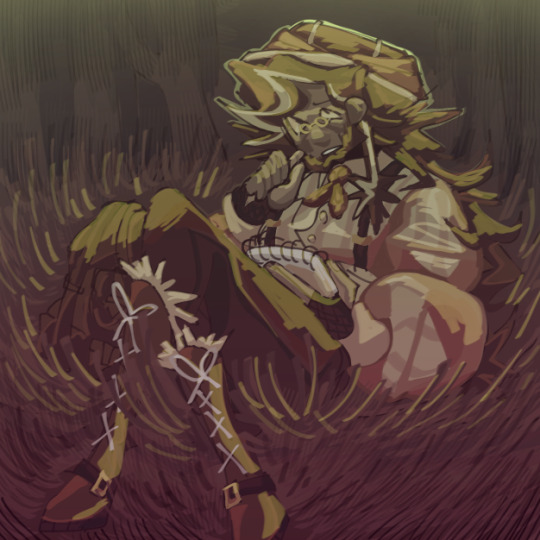
little wardin e spurrit doodle for perplexplore. yay
#my singing monsters#msm#msm fanart#wardin e spurrit#spurrit#art#my art#both my wardin e spurrit hc design and my spurrit gijinka design#even though they are basically confirmed to be separate#which makes me think#wardin is still out there isnt he?#waow. thats kind of fucked#like hes implied to be still alive#but nobody has a fucking clue where he is#thats sad. i think#okay whatever this is a silly little game about silly little monsters singing and dancing and playing instruments#but its not my fault the game has incredibly deep and intricate lore for a mobile game#whatever! it is what it is#or whatever they say. mm
60 notes
·
View notes
Text
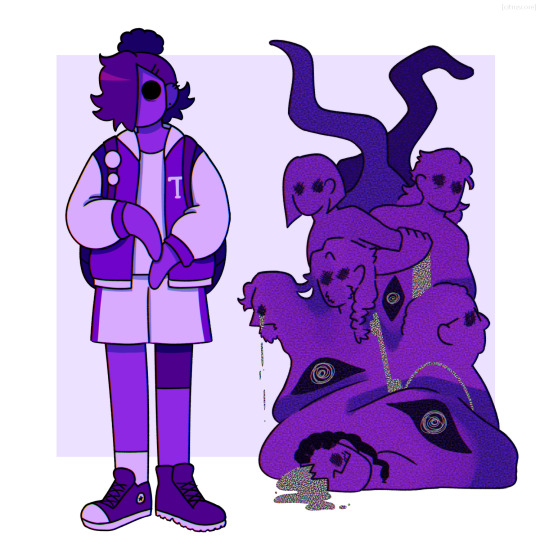
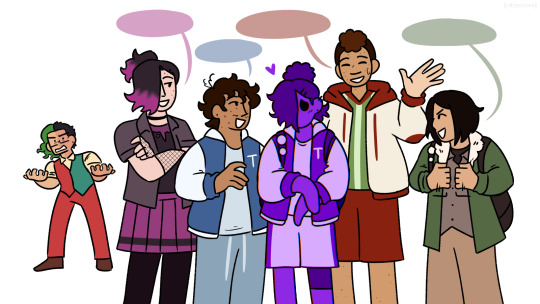
new teen just dropped
#dndads#the doodler#dude dndads#normal oak#scary marlowe#lincoln li wilson#taylor swift dndads#hermie the unworthy#im gonna be honest. i think theyre going to somehow forget hermie even more.#or maybe just put him somewhere like when he was babysitting the dads#anthony has so many npcs to juggle now#ANYWAYS dude. silly guy. i like its he/they/it swag#body horror#i realized pretty early on that i just kind of made zoe monster prom? which okay#not my fault theyre literally the same character. purple eldritch god turned high schooler?? okay#dndads spoilers
347 notes
·
View notes
Text
kind of late on this but with the info from the fanbook, my updated take on the whole teru’s parent’s situation is that he had parents that didn’t want him to need them, so he relied on his powers to help him be self sufficient so they’d be proud of him. only it worked too well and they used his self-sufficiency as an excuse to fuck off to who knows where. and he got a huge superiority complex because his powers were the only thing they ever praised about him + are the reason he got treated differently than other kids. and also made terrorists want to recruit him (#justprotagonistthings)
i don’t think he sees any problem with any of this btw like sure he rejects that ideology now but i think he’s like lol well what can ya do! :P he knows its wrong on some level because he never brings it up but also he’s so nonchalant about it that i don’t think he’s touched those feelings with a 10ft pole
#read through the fanbook stuff again and am thinking about my boy#tbh i kind of think teru's parents don't even know about claw it seems like they were pretty absent#even before the living alone thing#sorry for analyzing teru again. as if its my fault#he is my bug trapped under the microscope (affectionate)#rewatching mp100 with siblings and Noticing Things#teru
928 notes
·
View notes
Text
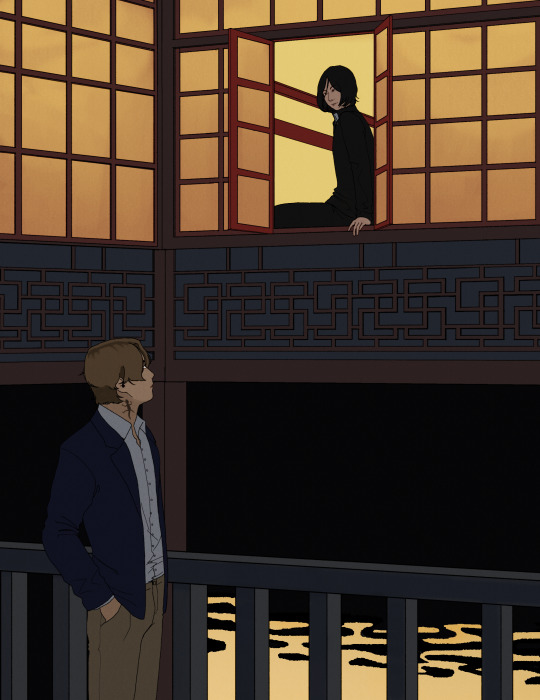
👁️🦎🎯
(crops under cut)
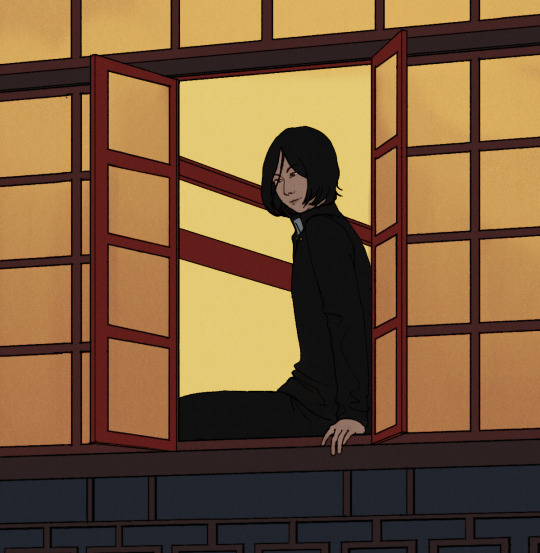
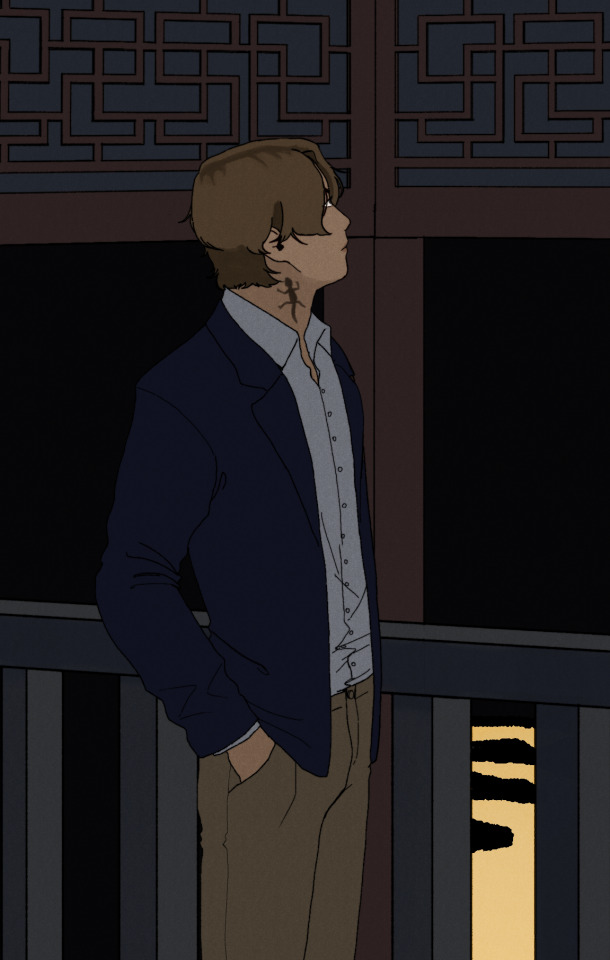
#natsume yuujinchou#matoba seiji#natori shuuichi#horrible exorcists#sorry i couldnt think of a caption i literally sat here for like 2 minutes lol#usually i use a quote from the scene or a lyric from a song but in this scene they're just Looking#anyway FUCK architecture#really though this is csp's perspective ruler's fault. i shoulda just done this by hand#but i made it work. since it wasnt super super complicated lol#ummm i feel like natori looks like a baby ceo but that is what he was wearing at least in the anime version of this scene#and midorikawa's kind of vague about clothes so i made it easy on myself#but why are you rolling up to the exorcist meeting in a navy blazer and tan chinos?#his uniform color is tan so ig the pants could be from that but the blazer......#tryna represent the natori clan in front of the other exorcists ig idk#meanwhile matobas just in his gakuran lol#hes not the clan head yet so he can just be there as a kid#he even gets told off by takuma and called seiji-kun.....could you imagine like.#it's weird for him to not be matoba#anyway. um i completely kind of fudged the architecture because its hard to tell where exactly in the building this scene is and#i had a specific composition in mind#i only realized i messed up how the windows work like 3/4 of the way into lineart soooo#but thats the kind of thing only i would notice probably#btw i was originally drawing a different scene of them but i was faced with the reality of foliage.#and i remembered this romeo and juliet ass scene existed so#i chose architecture LOL#okay last thing. i feel like natoris haircut is too polished and nice but fr wtf is his canon hair#im doing my best LOL.........but boy#OKAY im done
73 notes
·
View notes
Text
Jayce is fascinating because he thinks he’s the hero. And in another show he would be. But I’m not confident Arcane fully thinks he is.
He is trying to do the right thing but keeps stepping in situations he doesn’t understand, thinking they’re straightforward when they’re not.
He demanded Silco hand over Jinx for Zaun’s independence, thinking he was asking a drug lord to turn in his unstable and violent lieutenant, not realizing the ultimatum he gave Silco was “your daughter’s life or your city’s freedom.” No wonder Silco reacted badly!
He balked at killing a Zaunite child himself with his own hands. No wonder Vi taunted him and lost faith in him, saying, oh, now you’re precious about killing Zaunite children? When you have to see them die?
In frustration and anger, he said to Viktor’s face that Zaun residents were dangerous and violent, and only seemed a little embarrassed when Viktor reminded him sharply, “I’m from Zaun.” No wonder Viktor didn’t trust him with his shimmer plan—the reminder that Jayce saw him as one of the Good Ones, or maybe was only able to love and respect him if Jayce conveniently forgot that he was a Zaunite too. No wonder Viktor tried to do his dangerous medical experiments alone, only willing to tell Jayce after he was sure it worked and his actions could be justified. Because Viktor didn’t trust Jayce to back him up, to see him as a person worth respecting if he tried to use shimmer in his efforts to save his own life. (His professor, and the Council, sure don’t even want him to use hextech for that!) But Jayce didn’t give Viktor a reason to trust him with this: A Zaunite drug, smuggled across the bridge by a Zaunite. (Another untrustworthy, dangerous Zaunite, because that’s what those people are.) No wonder Viktor tried to do it all alone, and didn’t ask Jayce to be there to help him or watch out for him or support him or double-check his work or keep people out of the lab while he was experimenting. No wonder Sky walked in on him alone in a risky experiment she didn’t understand and didn’t have any way to know was going on, with no one to be able to tell her what was going on and to stay away, and died because of it.
Jayce is truly trying to do what is right… but he has a hard time getting out of his own head, and it ends up sabotaging the progress he believes in so strongly.
#‘Sky’s death was kind of Jayce’s fault for being fantasy racist at Viktor’ my Arcane hot take#Arcane#like it was super not lost on me the back and forth shots between ubermensch Jayce working out shirtless#And scrawny disabled terminally ill Viktor scrambling for a cure#Which is why I agree that I don’t think Arcane sees Jayce as purely a hero either
58 notes
·
View notes